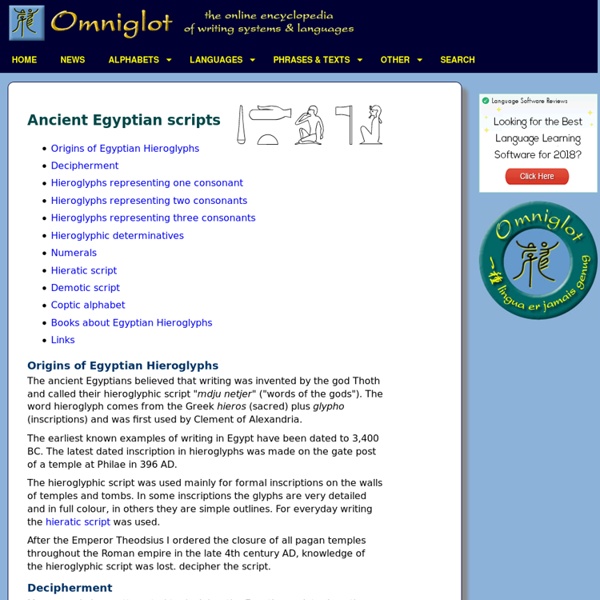How speaking multiple languages benefits the brain - Mia Nacamulli
Amazed by what you have learned about having a bilingual brain? Then, start learning another language now! This website has tons of free lessons, games and quizzes to get you started! Pick one language or even two languages and get that gray matter growing. Speaking more than one language is like exercise for the brain? Love all this brain talk? Want to learn another language (or two or three or...)?
Hiéroglyphes
Faites le premier pas , vous qui êtes déjà tout prêts , lancez-vous dans le "grand bain", vous verrez que l'on ne se noie pas , il suffit d'être un tant soi peu logique, méthodique et organisé; c'est vrai que l'approche est parfois difficile, que cela peut nous paraître parfois insurmontable, irréalisable, et que l'étude est assez ardue, mais c'est tellement intéressant , même passionnant . Et n'oubliez pas que le chemin est long, mais CEL@ VAUT LE COUP d'essayer, de démarrer... On en reparlera en 2003, en 2004, ... en 2010... Pour tous ceux qui débutent ou qui sont un peu avancés, j'ose me permettre de leur donner quelques "conseils" , ... qui ne sont , bien sûr, que des suggestions (et j'en profite pour me les rappeler , à moi aussi, qui vient tout juste de reprendre l'étude après avoir dû interrompre provisoirement après avoir suivi 2 années de cours à l'Institut Khéops à Paris...)
Ancient Egypt Online
OED birthday word generator: which words originated in your birth year
Do you know which words entered the English language around the same time you entered the world? Use our OED birthday word generator to find out! We’ve scoured the Oxford English Dictionary (OED) to find words with a first known usage for each year from 1900 to 2004. Simply select the relevant decade and click on your birth year to discover a word which entered the English language that year. Please note that the dates given for these words refer to the current first known usage of the word. The OED team is continuously researching the histories of words (something you may be able to help with), and it’s therefore possible that we will find an earlier sense of the words during our research. If you are a subscriber or have access to the OED, visit our guide to learn how to find your own personal OED birthday word. Click on your birth year in the left-hand column to discover your OED birthday word. Words originating in the 1900s include: Words originating in the 1910s include: Bollywood, n.
Tiyi Egyptologie
Ancient Greece
What we did | Mapping the origin of Indo-European
Step 1 – Building a database of cognates Cognates are similar words shared across languages and taken to indicate relatedness via common ancestry. To be diagnosed as cognate the words must have similar meaning and, most importantly, show systematic sound correspondences indicating a common origin. For example, the English word five has cognates in German (funf), Swedish (fem) and Dutch (vijf), reflecting descent from proto-Germanic (*fimf). Cognate identification can be tricky. The table below shows an example dataset with six languages and cognate sets colour coded across four meanings. We compiled a database of word forms and cognacy judgements across 103 Indo-European languages (including 20 ancient languages) and 207 meanings. Step 2 – Location data To work out where Indo-European languages have come from, we use information about where the contemporary languages in our sample are spoken today and where the ancient languages are thought to have been spoken. Figure: Germanic languages
Babbler birds could shed light on human language
Language: The chestnut-crowned babbler. Photo: Supplied Move over, parrots. Scientists studying the social birds have discovered that they can rearrange meaningless sounds in their calls to form different, meaningful messages. The findings, described in the journal PLOS Biology, may shed light on how the features of human language came to be. "Our results indicate that the capacity to rearrange meaningless sounds in order to create new signals occurs outside of humans," the authors wrote. It could hint at "a potential early step towards the generative phonemic system of human language", they added. One of the fundamental abilities that sets humans apart from other animals is language - the ability to string meaningless sounds together to communicate complex ideas to one another. Scientists have long studied different animals, from apes to zebra finches, for hints about the evolution of language abilities. Take the sounds A, T and B. Los Angeles Times
Playful Illustrations Make It Easy to Learn Chinese. By ShaoLan Hsueh.
Elephants distinguish age, gender, and ethnicity in human voices
Last week, we learned how elephants have a call that means “HUMAN”, used to alert other elephants to potential danger. This week, scientists reveal that elephants seem to know which humans might pose an actual threat: they can actually distinguish between humans’ age, gender, and ethnicity from just acoustic cues. Free-ranging elephants often encounter the cattle-herding Maasai people, who are semi-nomadic and sometimes kill elephants over conflicts over water or land for grazing. In a previous study, the scent of red robes worn by a Maasai man provoked a fearful response in elephants. To further tease this out, a team led by Karen McComb and Graeme Shannon from the University of Sussex recorded Maasai men, women, and boys, along with men of the nearby, crop-farming Kamba people. Further, the elephants were more likely to react defensively to playbacks of Maasai men than of Maasai women and boys. This is the first evidence of wild animals making fine distinctions in human voices.



